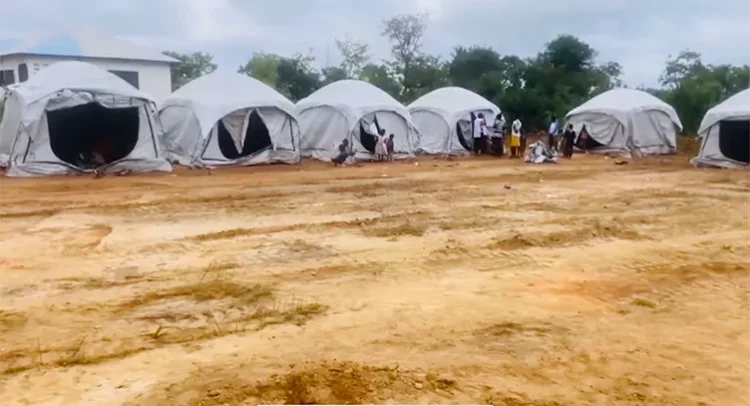The camp at Sawla.
About 48,000 displaced victims of the Gbiniyiri conflict are at risk of contracting cholera and other diseases due to the lack of water, sanitation, and hygiene (WASH) facilities at their camp in Sawla, in the Savannah Region.
The conflict occurred over a parcel of land between two factions and has resulted in the deaths of about 18 persons, with several others sustaining gunshot wounds and burning of houses and other properties during the clash.
The displaced individuals have been forced to defecate in the open around the camp, because there are no toilet facilities available.
A displaced victim, Nafisah, told DAILY GUIDE that they defecate in the bush near the camp where they live because they do not have any other options provided for them.
“We defecate at the bush where we live and eat even though we know it’s not good for our health, but you know our situation, and we do not have a choice since there are no toilet facilities,” she shared their plight.
She appealed to the authorities, as a matter of urgency, to provide them with WASH facilities to prevent the spread of diseases such as cholera around the camp.
Sustainable Development Goals
Ghana is committed to the Sustainable Development Goal 6, which calls for clean water and sanitation for all. The goal aims to ensure access to adequate and equitable sanitation and hygiene for everyone by 2030, with a focus on ending open defecation and addressing the needs of women, girls, and vulnerable populations.
Ghana Health Service
The Savannah Regional Director of Health Services, Dr. John Ekow Otoo, expressed concern over the health risks posed by open defecation at the camp.
“The major issue here is the lack of WASH facilities. Without proper toilets, people are forced to defecate in the open, which is detrimental to health. We are working with the Assembly and National Disaster Management Organisation (NADMO) to provide mobile toilets to improve the situation,” he stated.
Dr. Otoo assured that they are prepared to manage health emergencies at the camp, mentioning that an ambulance is on standby for critically ill patients needing hospital care.
Human Rights Perspective
Madam Blessilla Na-afoe Kandoh, Development Specialist /SRHR/GBV Expert, in an interview with DAILY GUIDE, noted that the absence of toilet facilities in displacement camps is not merely a logistical issue but a fundamental human rights concern.
“Safe sanitation, clean water, and menstrual hygiene are fundamental to the right to health and dignity. Without them, displaced families, especially women and children, face serious public health and protection risks. In such crowded and unhygienic settings, open defecation becomes unavoidable, creating fertile ground for disease outbreaks such as diarrhoea, cholera, and other infections children are particularly vulnerable to,” she said.
According to her, beyond health, the risks to safety and dignity are severe, adding that without proper sanitation facilities, women and girls are often forced to relieve themselves in unsafe and isolated areas, exposing them to harassment, assault, or other forms of gender-based violence, and the lack of menstrual hygiene support pushes many into unsafe practices that compromise their health and deepen stigma.
“The absence of privacy and dignity can also affect their psychosocial well-being, compounding the trauma of displacement,” she disclosed.
Madam Kandoh urged authorities to treat the situation as an emergency and provide the necessary facilities for the displaced people.
“Authorities, together with humanitarian and development partners, must treat these needs as urgent rights, not secondary concerns. They should prioritise the rapid installation of safe, gender-sensitive sanitation facilities, adequate numbers of toilets with proper lighting and locks, separate units for men and women, and facilities accessible to children and persons with disabilities.
“At the same time, clean water, menstrual products, and health education should accompany these efforts to prevent disease outbreaks and support dignity. In the longer term, a coordinated response plan that integrates protection, health, and shelter support will be essential to safeguard the rights and dignity of displaced families,” she added.
FROM Eric Kombat, Sawla


